Roundtrip Train Ride from Rancho Cucamonga to Vegas – Would You Pay $400?
Posted on: March 8, 2024, 04:06h.
Last updated on: March 11, 2024, 11:42h.
Commuting back and forth from Southern California by high-speed rail won’t only take longer than flying, it was revealed this week. It will also cost more.
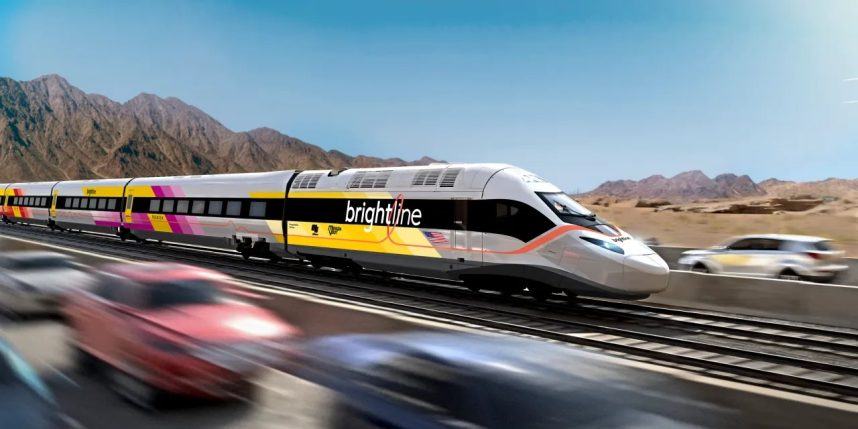
The bad news came directly from Brightline founder Wes Edens, who told the L.A. Times that his company “will eventually charge more than $400 for a round trip from Las Vegas to Rancho Cucamonga.”
Brightline West will cover the 218 miles at speeds of up to 200 mph, mostly along the Interstate 15 right-of-way. Light rail connections will carry passengers the 37 additional miles east from LA.
That will make the trip 2 hours and 10 minutes each way. Figuring in an hour for light rail, that’s more than twice as long as an average flight from L.A. to Las Vegas, at a roundtrip price of $75 more than flying.
Brightline estimates that 50 million people travel the route per year, 85% of them in cars.
“They’ll have to drive past our train station (in traffic) and then watch the trains whiz by them at 220 mph,” Edens, a private equity billionaire, told the Times. “It’ll be phenomenal.”
Ground is scheduled to be broken this spring, with an eye toward opening in time for the 2028 Olympics in L.A.
Off the Rails
That’s if Brightline West even gets going. The Biden administration has poured $3 billion taxpayer dollars into the project, along with access to $3.5 billion in tax-exempt bonds. However, nearly half of its $12 billion budget is still unaccounted for.
And now, the project faces swift and fierce pushback to the ticket price revelation.
“Who in their right mind would pay that amount when flying or driving, in most cases, costs much less?” Apple Valley resident Dana Bingham wrote in a letter to the L.A. Times editor. “Yes, the train seems to be more relaxing than flying and easier than driving. But a one-way fare of $80 seems to make much more sense. If the company doesn’t think it can make money at that price, it should just stop now and give any federal money for the project back so it can be used for something else.”
Numerous high-speed rail projects have failed in the U.S., where driving is cheaper and population centers are farther apart than in Europe, where they are commonplace and profitable.
In fact, talk of a Vegas to L.A. bullet train traces back to 2005, when Tony Marnell II, founder of the Rio, could not get his proposed XpressWest system to Victorville, Calif. out of the station.
A Brightline rail line in Florida has failed to meet ridership projections since its 2018 launch. According to a public bond filing, it logged an operating loss of $190 million during the first nine months of 2023. And a Brightline train from L.A. to San Francisco has tripled its original budget to $100 billion, and experienced significant construction delays since breaking ground in 2015.
“I wish them well,” Robert Poole, director of transportation policy for the Reason Foundation, told the Times. “I hope the plan works. But I’m skeptical.”
Related News Articles
Brightline High-Speed Rail from SoCal to Vegas Snags Another $2.5B
Las Vegas-SoCal High-Speed Rail Secures $3B in New Funding
High-Speed LA to Vegas Railway Gets Bipartisan Backing
Most Popular
Las Vegas Overstated F1 Race’s Vegas Impact — Report
Mega Millions Reportedly Mulling Substantial Ticket Price Increase
NoMad Hotel to Check Out of Park MGM on Las Vegas Strip
Most Commented
-
End of the Line for Las Vegas Monorail
— April 5, 2024 — 90 Comments -
Mega Millions Reportedly Mulling Substantial Ticket Price Increase
— April 16, 2024 — 8 Comments -
Long Island Casino Opponents Love New York Licensing Delays
— March 27, 2024 — 5 Comments
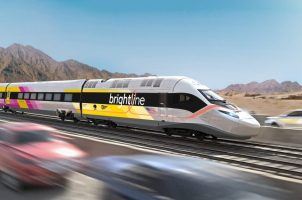
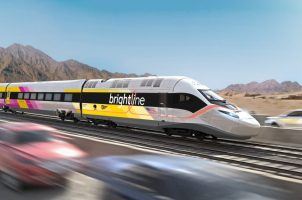
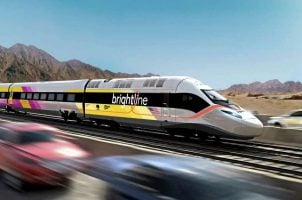
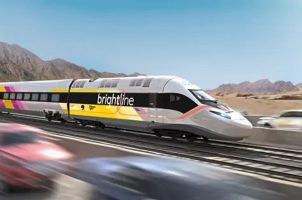












Last Comments ( 49 )
Finally, truth comes out...trains cannot compete with planes...or even personal vehicles...
Costs me about $25-30 using Tesla superchargers to get there, the hotel charges me for free, and then about $8 to get home comfortably (Lake Elsinore to Vegas). Why would I want to drive halfway there, pay around $400 to take the train, and then pay for taxis/ubers the rest of the time? Too expensive to make it worth it, unfortunately.
400.00 is a ridiculous amount of money to ride the train. This train is something many people have talked about and looked forward to having. This will exclude a lot of formerly excited passengers that will never be taken for a ride.
Don't forget the additional cost of getting back and forth to Rancho Cucamonga in order to get on this overpriced round trip to Vegas
$400 per person by train. $25 per person if in a car with friends or family. Yeah. Folks are gonna flock to the train.
By the time it opens a flight will be double. Solar power is cheap.
Although, train is a good option between Los Angeles and Las Vegas and Los Angeles and San Francisco; however, the cost of ticket forbids ridership. First, this travel will be in loss. Federal agencies have to make up for the loss. Start the ticket price at half the price to lore the riders then increase it slowly.
Most people won't pay $400.00 for a ticket to go Vegas. Maybe $100. People like to drive around when they get there. They love the experience with their family and friends. The train would be like the airport. You have to find a ride from the station to your destination. I don't see a lot of people being excited about $400 plus uber/Lyft. The only way this would be worth it is on holiday weekends when the drive back is 8 hrs
100% would not use this overpriced, overfunded train.
No! An incredibkenwaste of taxpayer money. Complete village idiots thta cane up with this idea
A $400.00 fare is problematic compared to other means of transportation. Considering the issue with ridership Briteline East $400.00 will be a hard sell. I hope it does well because the airlines need a formidable alternative to traveling thus they'll lower the fares to compete
Negative, will fly!!
Still don't get it, do you? Well, here's a little help for your tortured soul. It is 270 miles between Los Angeles and Las Vegas. That makes a round trip 540 miles. Those oh-so-generous souls at the IRS allow a whole 67 cents a mile for the true cost of driving. That makes the cost of driving that route - the real competition for rail - a real-world $361.80. And the trip takes 4 hours - if you drive non-stop like a 500 mile stock car race. You mean the people who RIGHT NOW drive that long drag through the desert can't possibly take a short drive to Rancho Cucamonga instead?
Once a month, I drive from Rancho Cucamonga to Las Vegas. It takes me 3 hours. The time of day anyone drives to LV depends on what time they travel. I make one Pit Stop and keep it moving. I don’t travel there on weekends. The travel time can increase 1-6 hours or longer if around major holidays not to mention car accidents.
$400, no way I can fly for less than that and get there much faster. Anyone who would pay half that amount needs their head examined